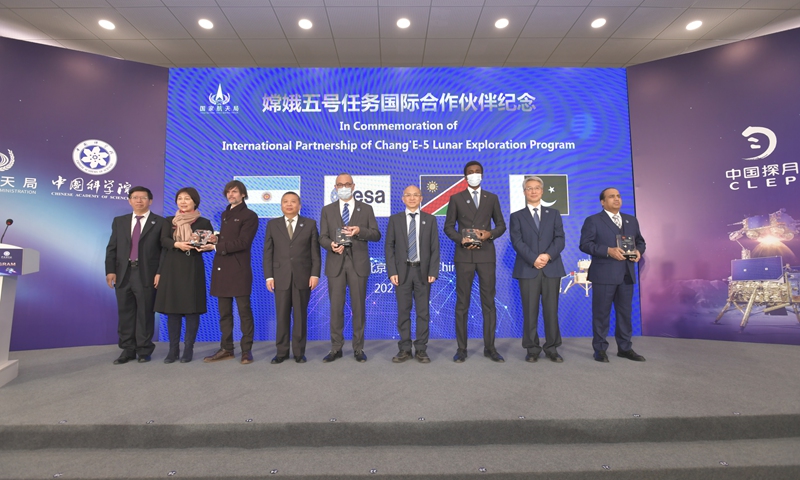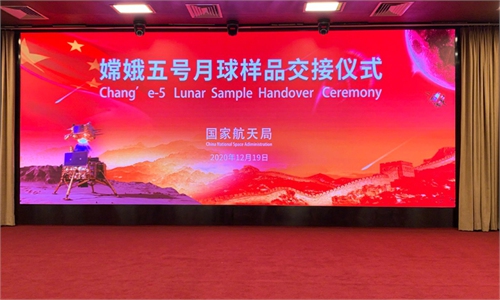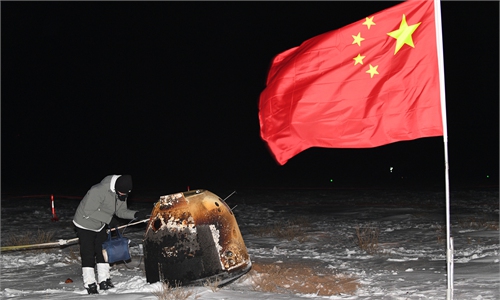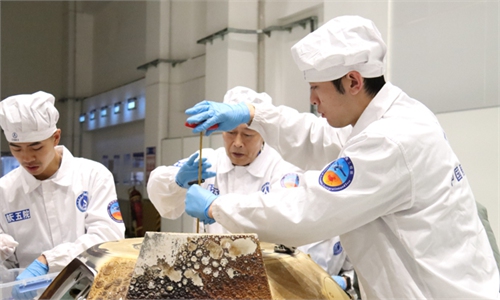
Delegates receive award at the event in commemoration of international parternership of Chang'e-5 lunar exploration program in January. Photo: CNSA
After opting not to join eight other countries, including the US in October 2020, in signing the Artemis Accords, a set of principles and norms for those who want to participate in the NASA-led Artemis lunar exploration program, Russia is reported to be in talks with China to work on details to determine the scientific tasks for a lunar base and to discuss technical aspects of the project's implementation, which is seen by Chinese observers as a conspicuous tilt toward China that is hardly surprising.
Chinese space analysts believe that the development fits a larger trend of both Russia and China encountering a range of difficulties in working with the US for different reasons, and becoming increasingly worried over how the US is pushing its space agenda, such as the Artemis Accords, aggressively and with an obsolete cold war mentality.
The American website spacenews.com reported on Wednesday, citing a statement from Russia's state space agency, "Roscosmos has completed domestic proceedings to harmonize the Memorandum of Understanding between the Government of the Russian Federation and the Government of the People's Republic of China on cooperation to create the International Lunar Research Station."
"The date to sign the above mentioned MoU has not been determined yet and is currently being discussed with Chinese partners," Roscosmos said. An Order of the Government of the Russian Federation related to the move was published online on February 11.
As the US-led Artemis lunar programs would suffer from the loss of Russia's space expertise, China, a nation that has seen remarkable triumphs in lunar space projects, including the first manned landing on the dark side of moon by its Chang'e-4 probe and most recently a successful lunar sample returning mission by the Chang'e-5 probe, will have a chance to learn from the best in the industry, space observers hailed.
"The Soviet Union launched 24 lunar probe missions, which gathered a considerable amount of valuable data, and will no doubt contribute greatly to the site selection of the potential human moon base," Pang Zhihao, a former researcher at the China Academy of Space Technology and a space science author, told the Global Times on Thursday.
Pang added that "Russia's expertises, including liquid oxygen kerosene engine technology as well as a complete, world-beating system for astronaut training, will all no doubt accelerate the program's advancement."
After closely following the return of the sample-carrying Chang'e-5 spacecraft back to Earth in December 2020, Wu Yanhua, deputy head of the China National Space Administration (CNSA), announced, during a press conference in Beijing, a new three-step plan for the country's future moon and deeper space exploration missions, which Wu referred to as "surveying, constructing, and exploiting," as opposed to the already conquered goals of "orbiting, landing and returning."
Cooperation with Russia in lunar exploration was also mentioned during the event. Xu Hongliang, a CNSA spokesperson, revealed that the Chang'e-7 is likely to explore the moon's south pole, which is similar to Russia's LUNA-26 probe mission. "Under the cooperation mechanism of the two governments, China and Russia are preparing to push forward relevant collaboration."
"We also welcome other countries around the world that are carrying out international moon base construction programs to join us, and make contributions to the cause of enhancing human well-being with space solutions," Xu noted.




